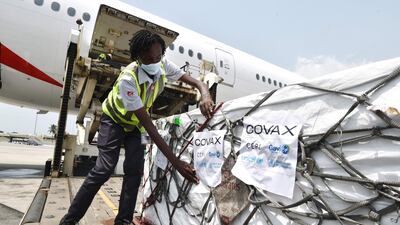Developing countries face a wait for their coronavirus vaccines after delays caused by legal wrangling between Pfizer and the WHO's global vaccine-sharing programmes.
The head of the Gavi vaccine alliance said on Tuesday that there have been delays to some Pfizer-BioNTech Covid-19 shot deliveries after the US drug company set out additional contractual requirements for their use.
Speaking at an online briefing, Gavi chief executive Seth Berkley told journalists the requirements were partly related to indemnification issues.
The WHO-backed Covax distribution initiative, which is assisting poorer and middle-income countries in their inoculation efforts, hopes to supply 237 million doses of the Oxford-AstraZeneca vaccine to 142 countries by the end of May.
Covax said that, as well as the first round of allocations of the Oxford-AstraZeneca vaccine, about 1.2 million doses of the Pfizer-BioNTech Covid vaccine were also expected to be delivered in the first quarter of 2021.
However, legal issues are reducing the number of shots immediately available to the Covax programme, it was revealed on Tuesday.
"The reason some of the numbers have changed is because it's the complexity of approvals and shipping, and so some of the timelines have slipped", Mr Barkley said.
"Pfizer has required countries to do some additional work with them on the deliveries and on some of the indemnification and liability issues, and that has taken more time.
"And that's one of the reasons that there has been a delay in rolling out that vaccine, as compared to the aspirations we had. But it's under way and we'll see some more announcements coming in the next few days."
At the same briefing, WHO advisor Bruce Aylward said vaccine campaigns in all countries could be under way in the first 100 days of 2021, assuming that manufacturers can keep up with orders. The timeline for the delivery of doses made by AstraZeneca and by India's Serum Institute will be split into separate two-month schedules.
"These timelines are dependent on a variety of factors including national regulatory requirements, availability of supply, and fulfilment of other criteria, such as validated national deployment and vaccination plans," a Covax statement read.
Covax delivered its first vaccines to Ghana and Ivory Coast last week and is expected to supply 11 million vaccines in a 10-day period.
However, many countries participating in the initiative face a shortfall as drug makers struggle to keep up with supply.
Iraqi authorities said in January they had approved three vaccines for use, but so far inoculation efforts have fallen short.
The country’s health ministry said on Tuesday it was expecting to receive a total of 16 million doses through the global Covax scheme. The WHO said it has initially approved 1.7 million Oxford-AstraZeneca shots for Iraq.
Iraq began coronavirus vaccinations on Tuesday with 50,000 Sinopharm shots donated by China. It said it is now looking at buying two million more doses from Beijing.


